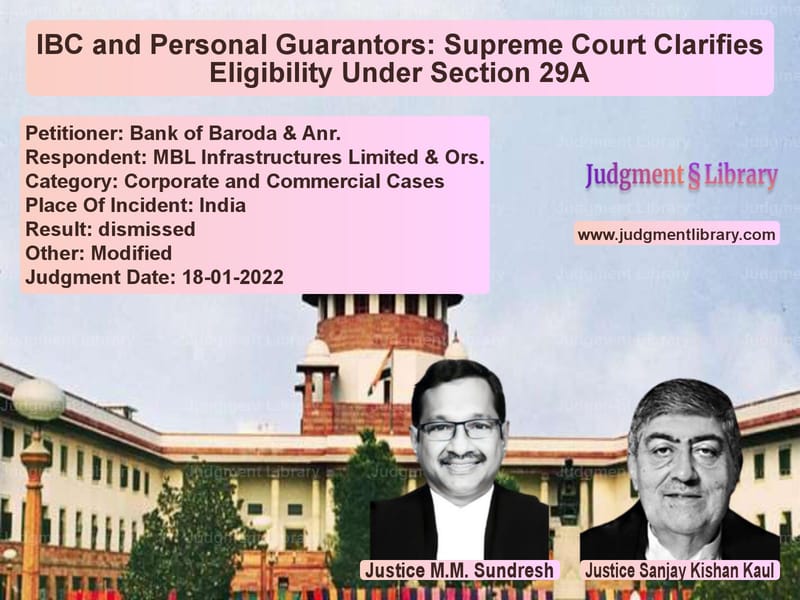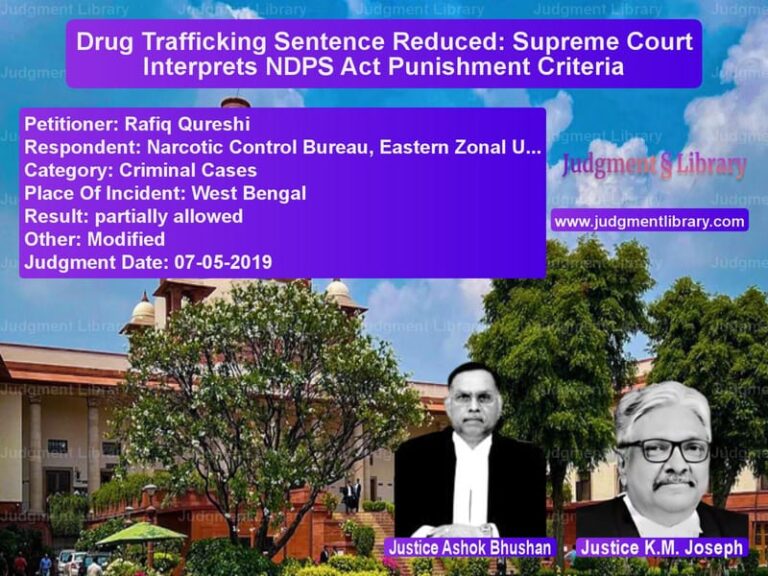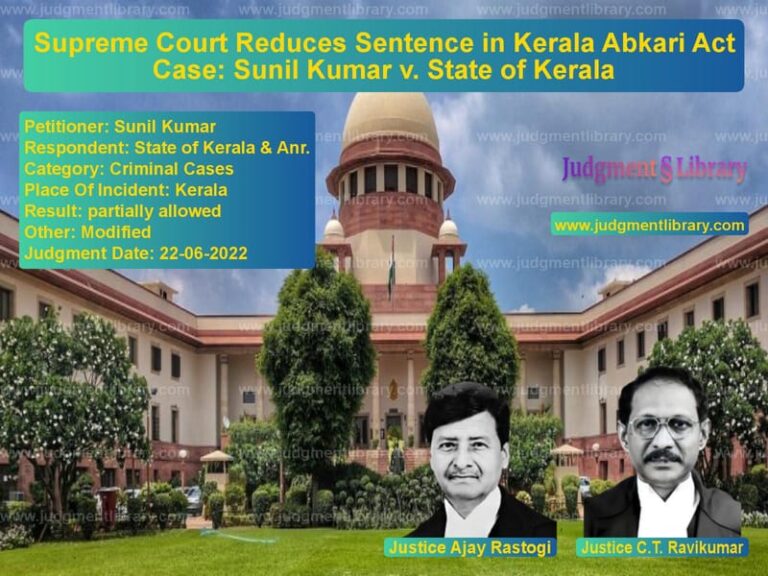IBC and Personal Guarantors: Supreme Court Clarifies Eligibility Under Section 29A
The case of Bank of Baroda & Anr. v. MBL Infrastructures Limited & Ors. revolves around the interpretation of Section 29A(h) of the Insolvency and Bankruptcy Code, 2016 (IBC). The Supreme Court was called upon to determine whether promoters who had executed personal guarantees for loans taken by a corporate debtor could submit a resolution plan under the Corporate Insolvency Resolution Process (CIRP).
Background of the Case
MBL Infrastructures Limited (MBL) had availed loans from multiple banks, including Bank of Baroda. Upon default, the banks invoked personal guarantees executed by its promoter, Anjanee Kumar Lakhotiya. Several banks, including RBL Bank and Allahabad Bank, initiated proceedings under the Securitisation and Reconstruction of Financial Assets and Enforcement of Security Interest Act, 2002 (SARFAESI Act), and the matter was eventually brought before the National Company Law Tribunal (NCLT) under Section 7 of the IBC.
During the CIRP, a resolution plan was submitted by Mr. Lakhotiya, the promoter of MBL, who had previously executed personal guarantees. This raised a crucial legal question: Was he eligible to submit a resolution plan under Section 29A(h) of the IBC?
Read also: https://judgmentlibrary.com/supreme-court-grants-leave-to-defend-in-commercial-contract-dispute/
Arguments of the Petitioners (Bank of Baroda & Other Creditors)
- Under Section 29A(h) of the IBC, any person who has executed an enforceable personal guarantee in favor of a creditor is ineligible to submit a resolution plan.
- Personal guarantees given by Mr. Lakhotiya had already been invoked by creditors, making him ineligible.
- The adjudicating authority (NCLT) erred in allowing the promoter to submit a resolution plan despite the explicit bar under the IBC.
- The resolution plan submitted by Mr. Lakhotiya was approved after the mandatory CIRP period had expired, making it legally unsustainable.
Arguments of the Respondents (MBL & Resolution Professional)
- Section 29A(h) of the IBC only applies when the personal guarantee has been invoked and remains unpaid.
- The invocation of the guarantee was disputed, and the promoter had not defaulted in making payments under the guarantee.
- The Committee of Creditors (CoC) had approved the resolution plan with the required voting share, making it legally valid.
- MBL was already an ongoing concern, and setting aside the resolution plan would disrupt public interest and affect thousands of shareholders and employees.
Key Observations of the Supreme Court
1. Interpretation of Section 29A(h)
The Supreme Court ruled that Section 29A(h) creates a clear disqualification for any person who has executed an enforceable personal guarantee in favor of a creditor of the corporate debtor if the guarantee has been invoked and remains unpaid.
“A personal guarantor who has not fulfilled their co-extensive liability with the corporate debtor is ineligible to submit a resolution plan.”
2. Timing of Disqualification
The Court clarified that disqualification under Section 29A(h) applies at the time of submission of the resolution plan. The fact that the resolution plan was submitted before the amendment to the IBC does not exempt the applicant from disqualification.
“Ineligibility under Section 29A must be determined at the time of the resolution process, not at the time of filing of the plan.”
3. Personal Guarantors and CIRP
The Supreme Court held that personal guarantors who have not fulfilled their financial obligations should not be allowed to regain control of the corporate debtor through the CIRP process.
“The purpose of Section 29A is to prevent defaulting promoters from misusing insolvency proceedings to regain control of their company at a discount.”
4. Approval of Resolution Plan After CIRP Deadline
The Court noted that the resolution plan was approved after the expiration of the mandatory 270-day CIRP period. However, it took into account that the plan had been implemented and that MBL was an ongoing concern.
“Although the resolution plan was approved beyond the statutory deadline, disturbing it now would be against the objective of the IBC.”
Final Judgment
The Supreme Court upheld the resolution plan but clarified the ineligibility of personal guarantors under Section 29A(h). The key takeaways are:
- Personal guarantors who have executed enforceable guarantees that have been invoked and remain unpaid are barred from submitting a resolution plan.
- Section 29A(h) applies at the time of submission of the resolution plan.
- The commercial wisdom of the Committee of Creditors should be respected, but legal disqualifications must be strictly enforced.
- Since MBL was already an ongoing concern, the Court refrained from setting aside the resolution plan, balancing procedural compliance with economic stability.
This judgment reinforces the principle that insolvency laws must prevent defaulting promoters from regaining control of distressed companies through backdoor routes while ensuring economic revival where possible.
Petitioner Name: Bank of Baroda & Anr..Respondent Name: MBL Infrastructures Limited & Ors..Judgment By: Justice M.M. Sundresh, Justice Sanjay Kishan Kaul.Place Of Incident: India.Judgment Date: 18-01-2022.
Don’t miss out on the full details! Download the complete judgment in PDF format below and gain valuable insights instantly!
Download Judgment: bank-of-baroda-&-anr-vs-mbl-infrastructures-supreme-court-of-india-judgment-dated-18-01-2022.pdf
Directly Download Judgment: Directly download this Judgment
See all petitions in Bankruptcy and Insolvency
See all petitions in Corporate Compliance
See all petitions in Company Law
See all petitions in Mergers and Acquisitions
See all petitions in Judgment by M.M. Sundresh
See all petitions in Judgment by Sanjay Kishan Kaul
See all petitions in dismissed
See all petitions in Modified
See all petitions in supreme court of India judgments January 2022
See all petitions in 2022 judgments
See all posts in Corporate and Commercial Cases Category
See all allowed petitions in Corporate and Commercial Cases Category
See all Dismissed petitions in Corporate and Commercial Cases Category
See all partially allowed petitions in Corporate and Commercial Cases Category







